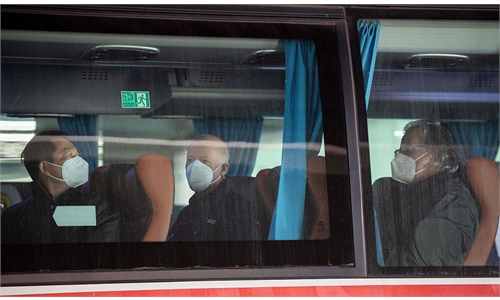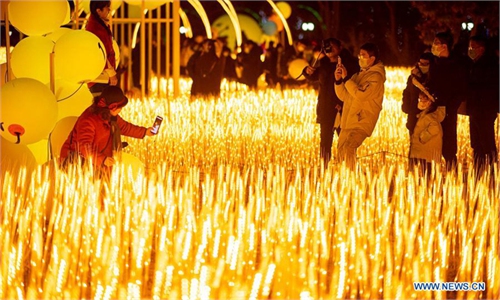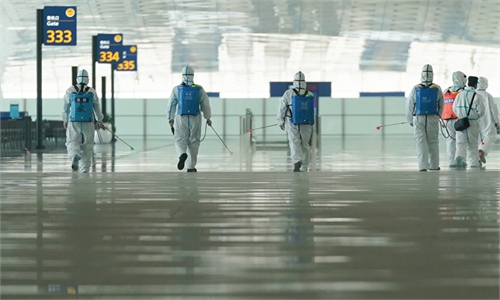A message from Wuhan residents to countries that scrutinized the city's lockdown, one year on
Lessons from Wuhan, one year on
Editor's note:
A year ago, Wuhan, where the coronavirus was first reported in China, made a decision that has little parallel in modern society: to lock down the city of 11 million. During the 76-day lockdown, the city struggled to save lives and contain the virus, while maintaining the daily lives of ordinary people, a strategy that Chinese top epidemiologists said to "suffocate the virus within Wuhan." The city was therefore dubbed a "heroic city," whose sacrifice paved the way for the quick recovery of the country. When the city returned to bustling normal life in April, and Western countries, one by one, faced a more severe onslaught of the coronavirus, many Wuhan people, initially puzzled by their government's decision to seal off the city, became staunch supporters of the decision. A year has passed; what impression has the lockdown left on Wuhan people and what's their message for countries that once ridiculed Wuhan's lockdown?
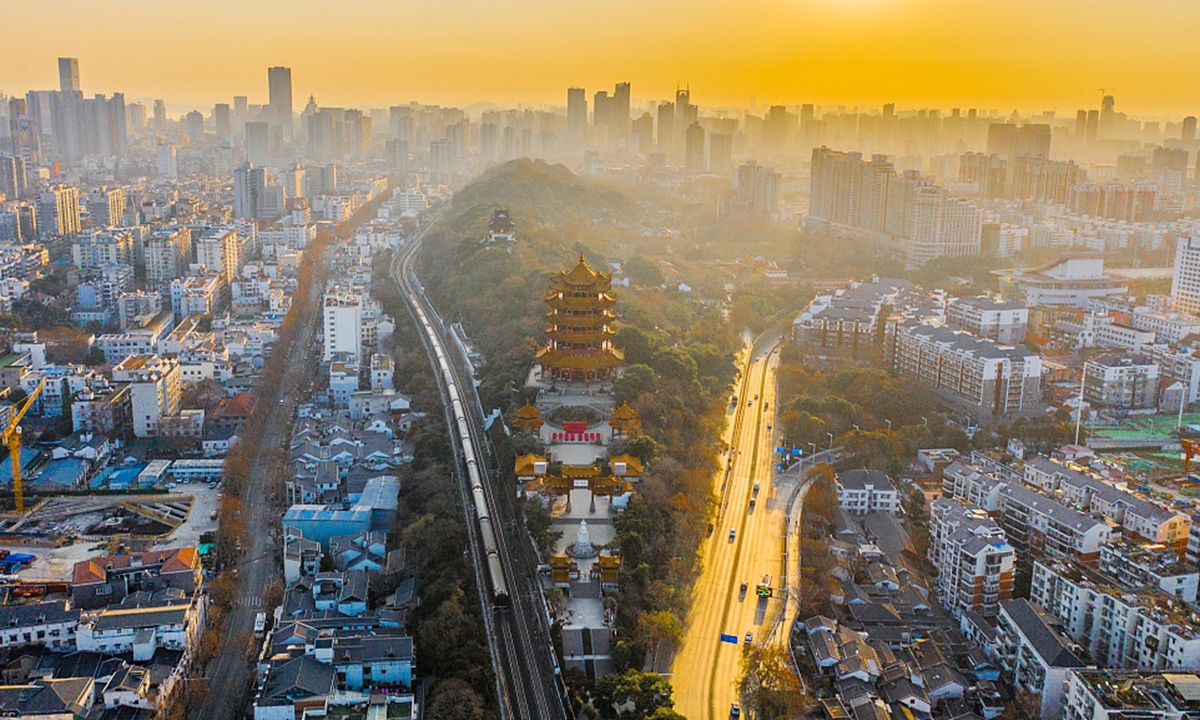
For most Wuhan residents, their memory of COVID-19, the pandemic that upended lives across the globe, started on January 23, 2020, the day the Wuhan government announced to seal off the city of 11 million people. The decision that has little parallel in modern society initially puzzled many locals, who soon turned into firm supporters of the strict management after seeing the city bounce back fast from its COVID-19 swoon while some Western countries, one-by-one, dragged their feet into coronavirus lulls.
Now, Wuhan's lockdown measures have become an enduring tool to quell the coronavirus worldwide. China, bouncing back fastest and strongest from the pandemic, has refined such management methods to a "precise virus prevention mode," where small outbreaks were contained one by one, with economic recovery barely affected. But countries like the US, which have been through several rounds of lockdowns, are still facing an onslaught of COVID-19, and the daily deaths of thousands almost became a new normal there.
One year on, what impression has the rare lockdown left on Wuhan people, and what's their message for countries that had ridiculed their choice?
The road back
Wuhan's Lily Wu went to the cinema on Friday to watch the movie Days and Nights in Wuhan. "I know it's sad, I know I am going to cry when I watch this film. But I really want to take another look at Wuhan back then."
The movie features the lives of ordinary people, from patients and medical staff to volunteers and community workers, when the coronavirus was wreaking havoc on the central Chinese city. The film was released on Friday, a day before the one-year anniversary of Wuhan's COVID-19 lockdown.
"Watching the movie is like tearing apart the scar that took a year to heal. The gloomy feeling was abundant in the cinema where almost the whole audience was wiping tears," said Wu.

She said that 11 million Wuhan people have 11 million different memories of the pandemic that ravaged the city at the beginning of 2020. Yet the date January 23 remains the pitch point of Wuhan people's collective remembrance of COVID-19, as it is the day the bustling city tumbled and paused for 76 days, and called on its people to start the arduous fight against the unknown monster.
When others were queuing to get out of Wuhan just ahead of January 23 last year, Gao Gao (pseudonym), a nurse who works in a local hospital, was getting in.
After she got the message from Wuhan's health department notifying all medical workers about a shortage of personnel and materials in Wuhan hospitals, Gao snuck out of her parents' house in neighboring Ezhou and drove alone to the epicenter.
"The road to Wuhan was empty. And people from every checkpoint I passed told me 'Be careful' once they knew I was heading to Wuhan. My heart sank deeper and deeper when I heard them say so."
Gao found sealed-off Wuhan resembled a person in a coma; only hospitals were "unusually active." She immediately devoted herself to work after arrival. The first patient she attended to was an 83-year-old who was just discharged from the ICU after testing negative for the virus. It took Gao, who usually works in an administrative office, two hours to change diapers for the elderly patient. "My clothes were soaked with sweat in winter."
After her first day's work, Gao discovered she got more than 30 unanswered calls from her parents. She faced torrents of scold from them, who just found out she went back to Wuhan when she answered their call. "They were angry and worried. They were crying, and so was I."
In the end, Gao's parents calmed down and told her to "Be careful."
Now that a year has passed, Gao said it's still hard for her to watch movies that retell Wuhan's lockdown stories. "The scar is still here. Wearing masks, washing hands and temperature tests are now the same habit as taking your phone out with you in Wuhan. Even coughing on the subway will scare people around you away. We were hurt badly; thus, we know better how to protect ourselves," said Gao.
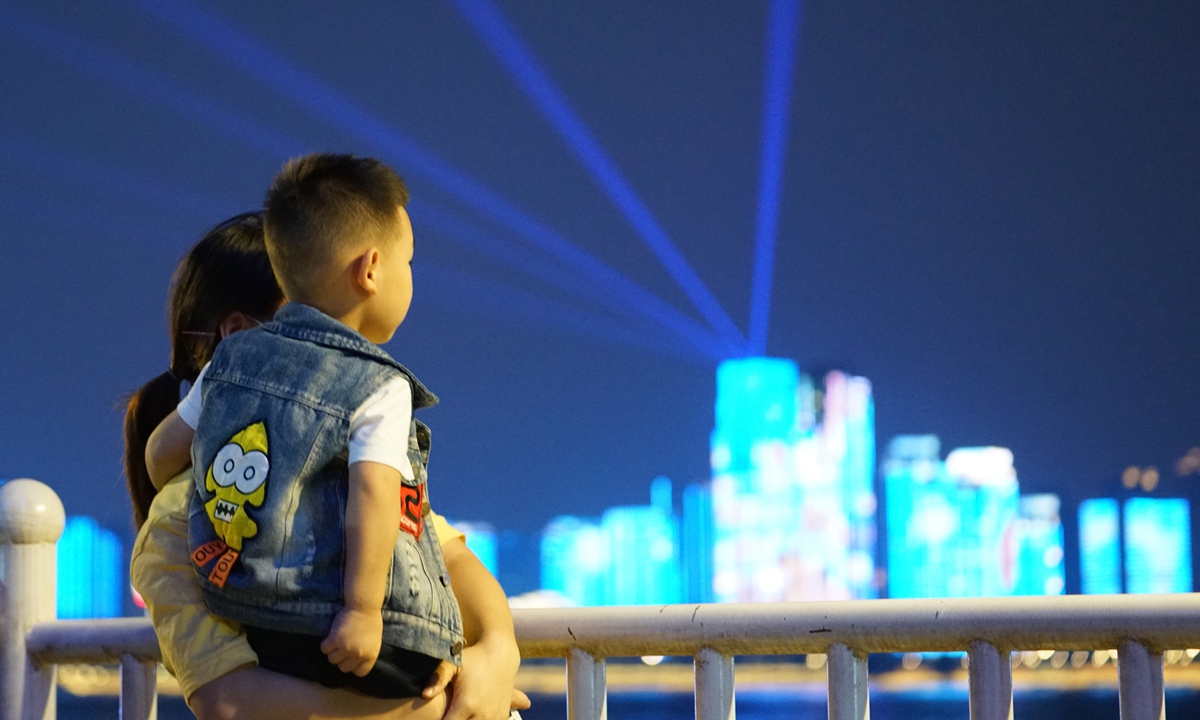
'Wuhan Jiayou'
Although Wuhan's announcement to seal off the entire city shocked the whole world like lightning in a clear sky, Wuhan local Chen Jing did not take it seriously upon first hearing it. "I never experienced lockdown. I did not even know how it works. How are you going to put a city of 11 million under quarantine?"
His questions were immediately answered when he was told not to step out of his home. Later Chen himself also contracted the coronavirus in early February, but he gave up the chance to be admitted to hospital for an elderly man whose condition was worse, and chose to stay in a quarantine hotel.
The decision of sealing off Wuhan confused Chen at the very beginning. But then he changed his mind after he saw how Western countries, especially European countries and the US, mishandled the pandemic, "which made people dying every day a new normal."
"I know many Western countries tried to copy Wuhan's lockdown method. But did they keep their virus carriers from wandering around? Did their governments have as effective enforcement as we do?" asked Chen.
Chen said it is the Wuhan people's strength and unity that made the city once in the "eye of the storm" now the "safest city on earth." "Those Western countries have no right to lambast Wuhan, with itself being dragged with high daily records. What are these 'human rights' they are always talking about? Keeping people alive is the most import part of human rights," said Chen.
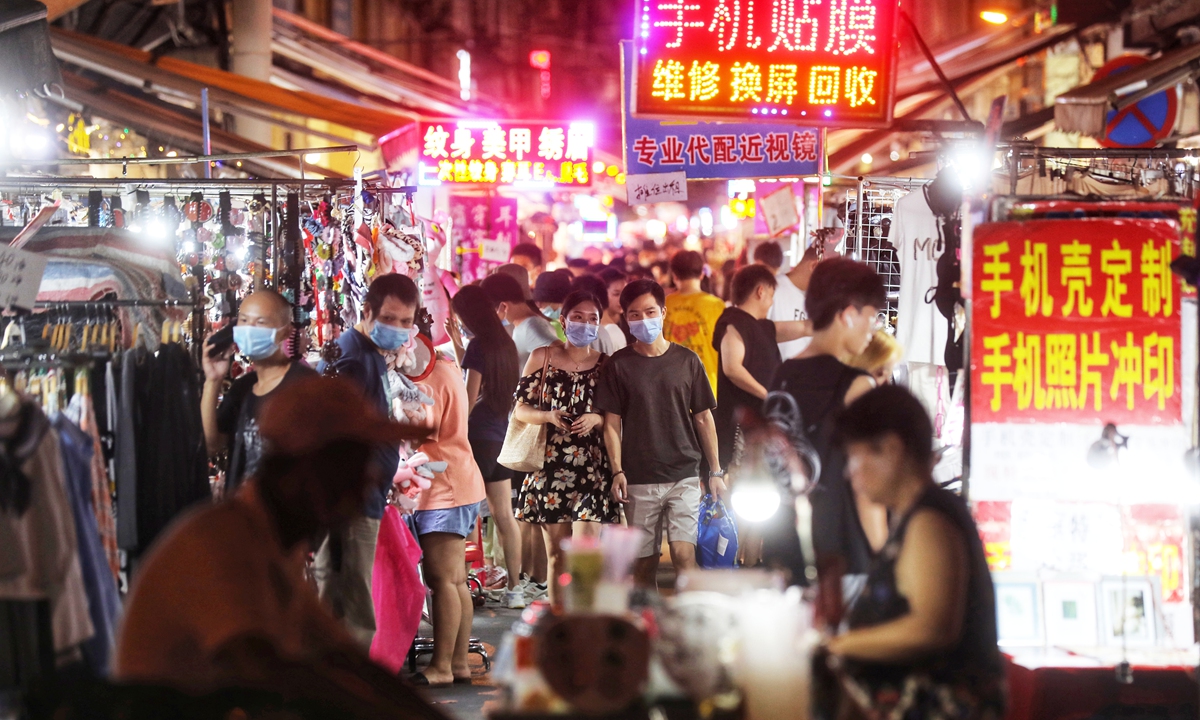
Chen Xingxu, founder of a Wuhan-based volunteer group focusing on providing help for coronavirus patients in the city, told the Global Times that he once escorted Yan Yiwei, a 1-month-old newborn who had contracted the virus, to Nanjing for treatment in early February when Wuhan was still under strict lockdown.
Chen said they drove past a checkpoint in nearby Anhui Province. The inspectors, who were leisurely talking and smoking by the road, suddenly stood up with high vigilance when Chen's car, with a Wuhan license plate, approached.
The inspectors shouted at Chen from a distance, "Keep your window ajar!" when he lowered the car window and tried to explain the situation. After hearing Chen's explanation, the inspectors let the car pass. "I heard them shouting 'Wuhan Jiayou [keep fighting, Wuhan]' behind me when I drove away," Chen said.
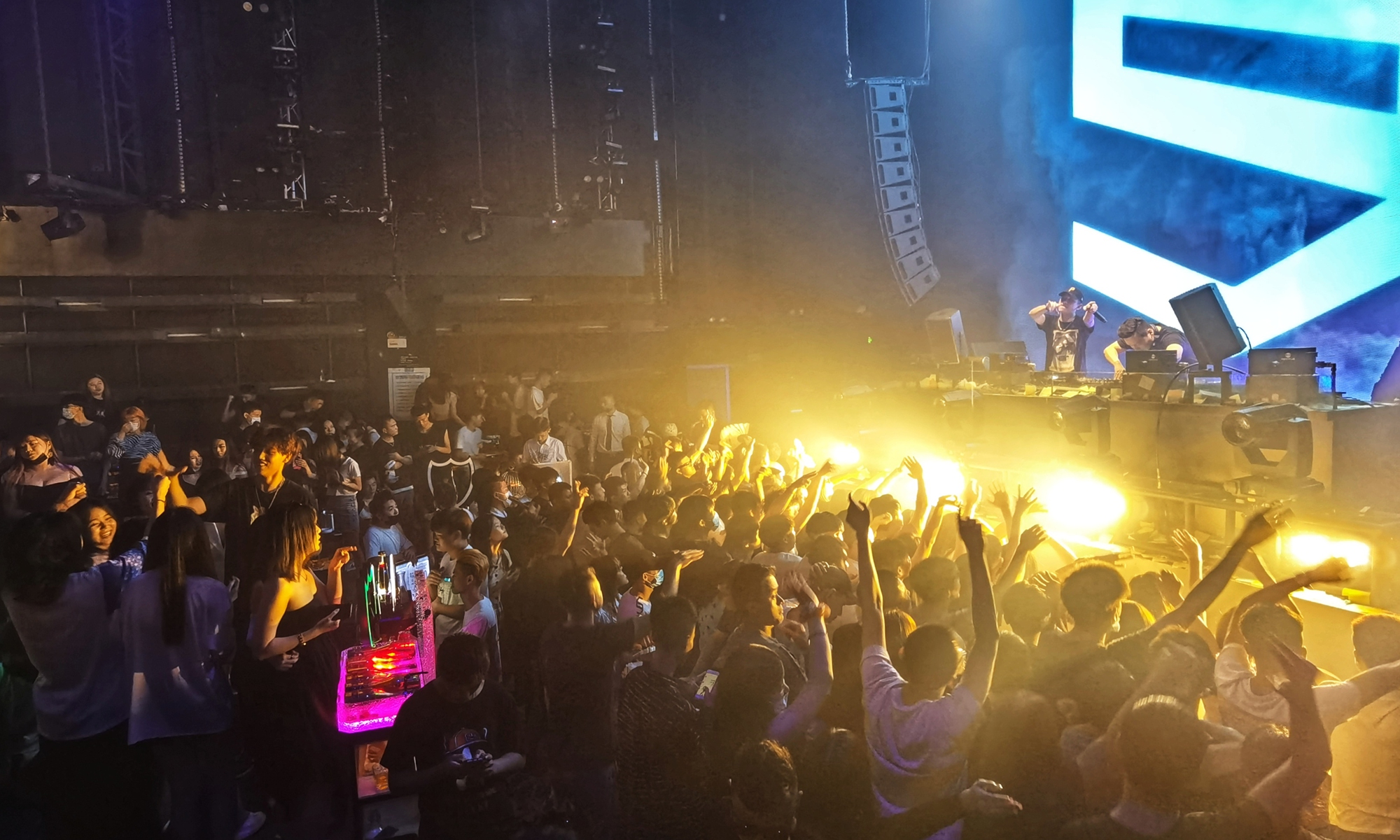
He said Wuhan people used to be aggressive and easily irritable. "It took an epidemic and a lockdown to expose that resilience, unity and never-surrender quality that has been buried deep in Chinese people's hearts. There were people who were dissatisfied about the lockdown in the early stages. But when the strict measures worked, when the Western countries one by one failed to contain the virus, more and more Wuhan people became staunch advocates of strict measures," said Chen.
A year ago, Wuhan, where the coronavirus was first reported in China, made a decision that has little parallel in modern society: to lock down the city of 11 million. During the 76-day lockdown, the city struggled to save lives and contain the virus, while maintaining the daily lives of ordinary people, a strategy that Chinese top epidemiologists said to "suffocate the virus within Wuhan." The city was therefore dubbed a "heroic city," whose sacrifice paved the way for the quick recovery of the country. When the city returned to bustling normal life in April, and Western countries, one by one, faced a more severe onslaught of the coronavirus, many Wuhan people, initially puzzled by their government's decision to seal off the city, became staunch supporters of the decision. A year has passed; what impression has the lockdown left on Wuhan people and what's their message for countries that once ridiculed Wuhan's lockdown?

Wuhan. Photo: VCG
For most Wuhan residents, their memory of COVID-19, the pandemic that upended lives across the globe, started on January 23, 2020, the day the Wuhan government announced to seal off the city of 11 million people. The decision that has little parallel in modern society initially puzzled many locals, who soon turned into firm supporters of the strict management after seeing the city bounce back fast from its COVID-19 swoon while some Western countries, one-by-one, dragged their feet into coronavirus lulls.
Now, Wuhan's lockdown measures have become an enduring tool to quell the coronavirus worldwide. China, bouncing back fastest and strongest from the pandemic, has refined such management methods to a "precise virus prevention mode," where small outbreaks were contained one by one, with economic recovery barely affected. But countries like the US, which have been through several rounds of lockdowns, are still facing an onslaught of COVID-19, and the daily deaths of thousands almost became a new normal there.
One year on, what impression has the rare lockdown left on Wuhan people, and what's their message for countries that had ridiculed their choice?
The road back
Wuhan's Lily Wu went to the cinema on Friday to watch the movie Days and Nights in Wuhan. "I know it's sad, I know I am going to cry when I watch this film. But I really want to take another look at Wuhan back then."
The movie features the lives of ordinary people, from patients and medical staff to volunteers and community workers, when the coronavirus was wreaking havoc on the central Chinese city. The film was released on Friday, a day before the one-year anniversary of Wuhan's COVID-19 lockdown.
"Watching the movie is like tearing apart the scar that took a year to heal. The gloomy feeling was abundant in the cinema where almost the whole audience was wiping tears," said Wu.

Tourists have fun at Playa Maya Water Park in Wuhan, central China's Hubei Province, Aug. 15, 2020. Photo:Xinhua
She said that 11 million Wuhan people have 11 million different memories of the pandemic that ravaged the city at the beginning of 2020. Yet the date January 23 remains the pitch point of Wuhan people's collective remembrance of COVID-19, as it is the day the bustling city tumbled and paused for 76 days, and called on its people to start the arduous fight against the unknown monster.
When others were queuing to get out of Wuhan just ahead of January 23 last year, Gao Gao (pseudonym), a nurse who works in a local hospital, was getting in.
After she got the message from Wuhan's health department notifying all medical workers about a shortage of personnel and materials in Wuhan hospitals, Gao snuck out of her parents' house in neighboring Ezhou and drove alone to the epicenter.
"The road to Wuhan was empty. And people from every checkpoint I passed told me 'Be careful' once they knew I was heading to Wuhan. My heart sank deeper and deeper when I heard them say so."
Gao found sealed-off Wuhan resembled a person in a coma; only hospitals were "unusually active." She immediately devoted herself to work after arrival. The first patient she attended to was an 83-year-old who was just discharged from the ICU after testing negative for the virus. It took Gao, who usually works in an administrative office, two hours to change diapers for the elderly patient. "My clothes were soaked with sweat in winter."
After her first day's work, Gao discovered she got more than 30 unanswered calls from her parents. She faced torrents of scold from them, who just found out she went back to Wuhan when she answered their call. "They were angry and worried. They were crying, and so was I."
In the end, Gao's parents calmed down and told her to "Be careful."
Now that a year has passed, Gao said it's still hard for her to watch movies that retell Wuhan's lockdown stories. "The scar is still here. Wearing masks, washing hands and temperature tests are now the same habit as taking your phone out with you in Wuhan. Even coughing on the subway will scare people around you away. We were hurt badly; thus, we know better how to protect ourselves," said Gao.

A woman and her son watch light show in Wuhan on September 30. Photo: Xinhua
'Wuhan Jiayou'
Although Wuhan's announcement to seal off the entire city shocked the whole world like lightning in a clear sky, Wuhan local Chen Jing did not take it seriously upon first hearing it. "I never experienced lockdown. I did not even know how it works. How are you going to put a city of 11 million under quarantine?"
His questions were immediately answered when he was told not to step out of his home. Later Chen himself also contracted the coronavirus in early February, but he gave up the chance to be admitted to hospital for an elderly man whose condition was worse, and chose to stay in a quarantine hotel.
The decision of sealing off Wuhan confused Chen at the very beginning. But then he changed his mind after he saw how Western countries, especially European countries and the US, mishandled the pandemic, "which made people dying every day a new normal."
"I know many Western countries tried to copy Wuhan's lockdown method. But did they keep their virus carriers from wandering around? Did their governments have as effective enforcement as we do?" asked Chen.
Chen said it is the Wuhan people's strength and unity that made the city once in the "eye of the storm" now the "safest city on earth." "Those Western countries have no right to lambast Wuhan, with itself being dragged with high daily records. What are these 'human rights' they are always talking about? Keeping people alive is the most import part of human rights," said Chen.

Crowds fill a night market in Baocheng Road in Wuhan in August. Photo: Cui Meng/GT
During the lockdown, Wuhan was not fighting alone. More than 40,000 medical workers were dispatched to help Wuhan, and the whole Hubei Province, since the outbreak began. Also, materials and life supplements were pouring into the central Chinese city from all over China, and even from the rest of the world.Chen Xingxu, founder of a Wuhan-based volunteer group focusing on providing help for coronavirus patients in the city, told the Global Times that he once escorted Yan Yiwei, a 1-month-old newborn who had contracted the virus, to Nanjing for treatment in early February when Wuhan was still under strict lockdown.
Chen said they drove past a checkpoint in nearby Anhui Province. The inspectors, who were leisurely talking and smoking by the road, suddenly stood up with high vigilance when Chen's car, with a Wuhan license plate, approached.
The inspectors shouted at Chen from a distance, "Keep your window ajar!" when he lowered the car window and tried to explain the situation. After hearing Chen's explanation, the inspectors let the car pass. "I heard them shouting 'Wuhan Jiayou [keep fighting, Wuhan]' behind me when I drove away," Chen said.

Young people in Wuhan dance to trendy electronic music at a local night club Friday, a seemingly ordinary start to the weekend. Photo: Cui Meng/GT
He said Wuhan people used to be aggressive and easily irritable. "It took an epidemic and a lockdown to expose that resilience, unity and never-surrender quality that has been buried deep in Chinese people's hearts. There were people who were dissatisfied about the lockdown in the early stages. But when the strict measures worked, when the Western countries one by one failed to contain the virus, more and more Wuhan people became staunch advocates of strict measures," said Chen.


